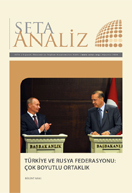Prof. Efraim Inbar - whose works on Turkish-Israeli relations deserve much credit - recently wrote an op-ed piece "An open letter to my Turkish friends" in The Jerusalem Post in which he paints a grotesque picture of Turkey's new foreign policy vision and domestic political developments. It misleadingly confines the multi-dimensional Turkish foreign policy vision to politics of ideology that is reminiscent of the Cold War years.
Turkish-Israeli relations, which had been kept at a minimum level for decades since the latter's establishment, gained momentum with the end of the Cold War. The increasing volume of relations, the countries' parallel views about the Middle East, and, most importantly, the perception of a common enemy (Syria, Iraq, Iran), carried Turkish-Israeli relations to a "strategic partnership."
Both states then perceived themselves as being surrounded by the same hostile "rogue" states; and this perception motivated both to accept the other as a valuable strategic partner in a generally hostile political environment.
HOWEVER, SINCE the early 2000s Turkish foreign policy has experienced a fundamental change; and Turkey's regional and global role, its relations with the countries of the Middle East, and its long-lasting international disputes have been redefined. Examples of this ongoing process include Turkish emphasis on its full membership to the EU, rapprochement with Syria and Armenia, friendly relations with Iran, official signing of the Nabucco project, energy agreements with Russia, overtures toward a solution to the Kurdish and Cyprus issues, and increasing interest Middle Eastern affairs and the Arab-Israeli peace talks.
Turkey's "zero-problem-with-neighbors" policy has so far paid off by creating new diplomatic and economic venues, strengthening its regional and global standing considerably, and helping it to get a more active role in world affairs through its memberships in the UN Security Council and the G-20. Even though this process has caused the Turkish-Israeli "strategic partnership" to lose some steam, it was shaped not by Islamic impulses, but by purely rational diplomatic and strategic choices. As a result of this process, Turkey has not only become a more Middle Eastern country, but also a more European, a more Mediterranean, and a more Caucasian one.
Turkish-Iranian relations can best be explained by rational economic and strategic motives, and particularly Turkey's growing energy needs. Correspondingly, Turkish interests lie in a peaceful Iran (in a peaceful region) which is ready to engage in business with Turkey, and, therefore, a possible military confrontation in the region is in direct contrast with Turkish economic interests.
That is exactly why Turkey has been encouraging a diplomatic solution to the Iranian nuclear issue, warning Iran - when Ahmedinejad visited Turkey - from building nuclear weapons and getting into a war with the United States and Israel.
In addition, Turkey has been supporting the idea of finding ways to include Hamas in the peace talks to ensure the sustainability of Israeli-Palestinian peace track. The ultimate aim of the Turkish strategy concerning Hamas is to find a sustainable solution to the Palestinian problem; and it is clear that the helping hand of Turkey could have been instrumental on several issues, including but not limited to freeing the captive Israeli soldier, Gilad Schalit.
As Prof. Inbar argues, Turkey's position vis-à-vis Israel during the Operation Cast Lead cannot be simply explained by Turkish domestic public opinion needs alone.
There is of course another side to it: the humanitarian crisis in Gaza as later documented by the Goldstone report.
If you do not engage in diplomacy, it is highly probable that you will not reach a sustainable solution. This is Diplomacy 101, and not only true for the Arab-Israeli conflict or Iran, but also for Sudan. In this framework, Turkey hosted Sudanese President, Omar Hassan Al-Bashir, and conveyed its worries about the gen









